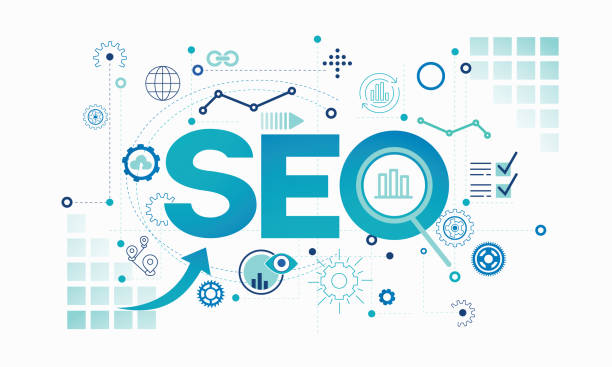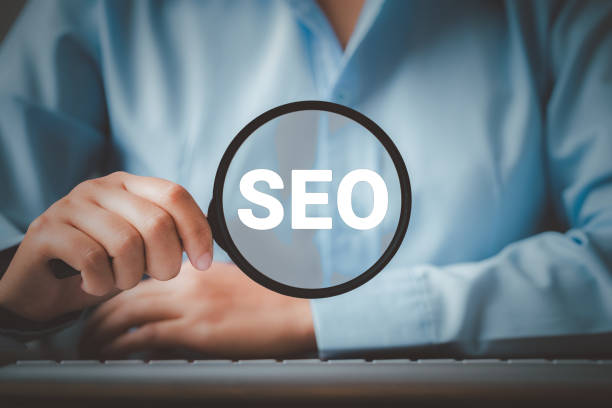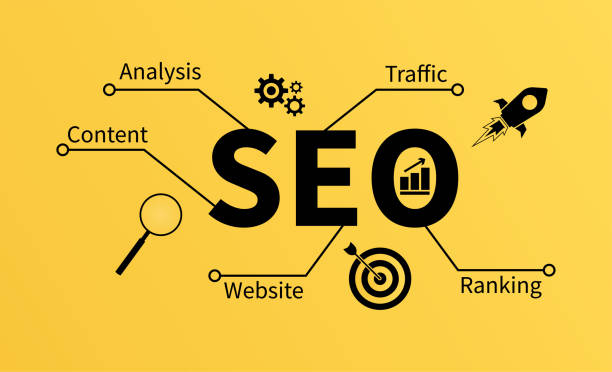What is SEO and Why is it Important?
In today’s digital world, being seen means existing.
This is where the concept of #SEO or #Search_Engine_Optimization shows its importance.
SEO is a set of methods and techniques that help websites rank higher in the natural search results of search engines like Google, Bing, and Yahoo.
The main goal of SEO is to increase organic website traffic, meaning users are naturally guided to your site through search without paying.
The importance of SEO stems from the fact that a large portion of internet users turn to search engines to find the information, products, or services they need. Appearing on the first pages of search results not only adds credibility and trust to your business but also significantly increases the chance of attracting potential customers.
This process is a continuous #educational approach that helps businesses understand the principles and best practices of optimizing their website and gain a competitive advantage.
A fundamental understanding of SEO is the first step for any online business to make its mark in today’s competitive market.
Did you know that customers’ first impression of your company is your website? With a powerful corporate website from Rasawb, multiply your business’s credibility!
✅ Custom and eye-catching design tailored to your brand
✅ Improved user experience and increased customer acquisition
⚡ Get free consultation!
Types of SEO: Basic Concepts
SEO is a broad and multifaceted field, and to achieve full success, one must understand its various dimensions.
Generally, SEO is divided into three main categories, each focusing on different aspects of a website and the online environment: On-Page SEO, Off-Page SEO, and Technical SEO.
#On_Page_SEO includes all actions performed within your website to improve its ranking in search results.
These actions include content optimization, proper keyword usage, optimizing titles and meta descriptions, URL structure, and internal linking.
#Off_Page_SEO refers to activities performed outside your website, aiming to increase your domain’s authority and visibility.
The most important aspect of Off-Page SEO is backlinking, which involves acquiring links from other reputable websites.
Finally, #Technical_SEO deals with the technical aspects of a website to ensure that search engines can easily crawl and index your site.
This includes optimizing site speed, mobile responsiveness, site structure, sitemaps, and the robots.txt file.
Understanding these three dimensions and integrating them into a comprehensive strategy is essential for any SEO program and provides a clear #explanation of how search engine optimization works.
Content Optimization (On-Page SEO)
Content optimization forms the heart of #On_Page_SEO and involves a set of actions taken to ensure your website’s content is relevant and high-quality for both users and search engines.
The first step in this process is accurate #Keyword_Research; finding the words and phrases your target audience uses for searching.
Then, these keywords should be naturally placed in titles, meta descriptions, heading tags (H1, H2, H3), and the main body of the content.
The page title (Title Tag) and meta description are the first things users see in search results, so they should be appealing and include the main keyword to increase click-through rate (CTR).
Additionally, optimizing images with appropriate Alt tags, internal linking between related website pages, and ensuring content readability and organized structure (using short paragraphs, lists, and images) are other vital aspects of content optimization.
This section of SEO provides a practical #guidance for improving your content’s ranking.
Below is a checklist of important content optimization items:
| On-Page Factor | Description | Importance |
|---|---|---|
| Page Title (Title Tag) | The most important On-Page factor, including the main and attractive keyword. | Very High |
| Meta Description | An attractive summary of the content that encourages users to click. | Medium to High |
| Heading Tags (H1-H6) | Structuring content and highlighting keywords. | High |
| Internal Linking | Creating connections between related site pages to improve user experience and search engine crawling. | High |
| Image Optimization (Alt Text) | Explaining image content for search engines and accessibility. | Medium |
| Keyword Density | Natural and logical use of keywords without over-stuffing. | Medium |
| Content Readability | Proper structuring, short paragraphs, and use of lists for ease of reading. | High |
Link Building and Authority (Off-Page SEO)
#Off_Page_SEO primarily focuses on activities performed outside your website, aiming to increase your site’s credibility, authority, and visibility in the eyes of search engines.
The most important aspect of Off-Page SEO is #Backlinking, which means receiving links from other websites to your site.
Search engines consider inbound links as a “vote of confidence” from other sites; the higher the quality and relevance of your links, the more credible and trustworthy your website appears.
These links should come from websites with high #Domain_Authority and be relevant to your business area to have the greatest impact.
There are various strategies for link building, including: creating high-quality content that naturally attracts links (organic link building), guest posting on other blogs, fixing broken links on other websites, and participating in relevant online communities.
Link building is a time-consuming process requiring precision, as the quality of links takes precedence over their quantity. Spammy or unnatural links not only fail to improve ranking but may also lead to penalties from search engines.
This section of SEO requires a #specialized and strategic approach to ensure that every acquired link contributes to your site’s overall authority.
Disappointed with your e-commerce site’s low conversion rate? Rasawb transforms your e-commerce site into a powerful tool for attracting and converting customers!
✅ Significant increase in visitor-to-buyer conversion rate
✅ Unparalleled user experience to boost customer satisfaction and loyalty⚡ Get free consultation from Rasawb!
Technical SEO and Its Role
#Technical_SEO addresses the infrastructure and technical aspects of a website to ensure that search engines can easily crawl, index, and rank its pages.
Although this dimension of SEO may be invisible to users, it plays a vital role in the success of an #SEO strategy.
Website loading speed (Page Speed) is one of the most important factors; a site that loads quickly offers a better user experience and is preferred by search engines.
Core Web Vitals (including LCP, FID, CLS) are important metrics that Google uses to evaluate user experience and site speed.
In addition to speed, #Mobile_friendliness of the site is also highly important, as a large portion of searches are performed via mobile devices.
URL structure, the use of XML Sitemaps to help search engines find pages, proper use of the robots.txt file to control crawling, and implementation of Structured Data to help search engines understand content and display it as Rich Snippets in search results, are other key aspects of technical SEO.
This field requires #analytical knowledge and high precision to ensure there are no technical barriers to your website’s visibility and that technical search engine optimization is well executed.
Click here to preview your posts with PRO themes ››
The Role of Keywords in SEO Strategy
Keywords form the backbone of any successful #SEO_Strategy.
They are the words and phrases that users type into search engines to find the information, products, or services they are looking for.
Comprehensive keyword research is the process of identifying these words and phrases and analyzing their search volume, competition, and relevance to your content.
Keywords can be categorized into different types such as short-tail keywords, which are generally one to two words (e.g., “SEO”), long-tail keywords, which are longer and more specific phrases (e.g., “best SEO tools for beginners”), and LSI (Latent Semantic Indexing) keywords, which are semantically related terms.
Choosing the right keywords helps you create content that accurately addresses the needs of your target audience and attracts relevant traffic. This process is not only #educational but also requires creativity and a deep understanding of user behavior.
Tools like Google Keyword Planner, SEMrush, and Ahrefs help you identify high-volume and low-competition keywords.
Natural use of keywords in content, without “keyword stuffing,” is very important for Google, as Google’s algorithms have become smarter and prioritize content quality and relevance over keyword repetition.
This factor is considered one of the most important in achieving strong SEO.
SEO Analysis and Tools
To monitor the performance of your #SEO strategy and identify opportunities for improvement, using analytical tools is essential.
These tools provide valuable insights into website traffic, keyword rankings, backlink performance, and potential technical issues.
#Google_Analytics is one of the most powerful free tools that allows you to track user behavior on your site, including the number of visitors, time spent on site, and bounce rate.
#Google_Search_Console is another vital tool that provides a direct view of how Google interacts with your site, including crawl errors, inbound and outbound links, and the keywords your site is visible for.
In addition to Google’s tools, specialized platforms like SEMrush, Ahrefs, and Moz Pro offer comprehensive tools for keyword research, competitor analysis, backlink auditing, and rank tracking.
Using these tools allows you to make data-driven decisions and maximize the effectiveness of your SEO efforts. Regular data analysis can also help you find answers to #questionable_content; for instance, why traffic to a specific page has decreased or which keywords yield the best results.
Understanding and mastering these tools is crucial for any #Search_Engine_Optimization specialist.
Below is a table of some of the most important SEO tools and their main uses:
Click here to preview your posts with PRO themes ››
| SEO Tool | Main Use | Type |
|---|---|---|
| Google Analytics | Website traffic and user behavior analysis | Free |
| Google Search Console | Monitoring website performance in search results, crawling, and indexing | Free |
| SEMrush | Keyword research, competitor analysis, backlink analysis, technical SEO | Paid (Limited free version) |
| Ahrefs | Backlink analysis, keyword research, content analysis | Paid |
| Moz Pro | Keyword research, backlink analysis, rank tracking, local SEO | Paid (Limited free version) |
| PageSpeed Insights | Page loading speed analysis | Free |
Local SEO for Physical Businesses
#Local_SEO is a specialized branch of SEO that helps physical businesses appear in local search results.
If your business has a physical location and provides services to customers in a specific geographical area (such as restaurants, stores, or medical offices), local SEO is crucial for you.
Its main goal is for potential customers near you to easily find your business in local searches (e.g., “restaurant near me” or “best car repair shop in Tehran”).
The core of local SEO is optimizing your #Google_My_Business (GMB) profile.
Accurate completion of GMB information, including address, contact number, business hours, photos, and gathering customer reviews, is highly important for local ranking.
In addition to GMB, creating “Local Citations” in online directories, and optimizing website content with local keywords (e.g., “SEO services in Isfahan”) also play a significant role. Customer reviews on various platforms also impact your credibility and ranking.
This approach provides you with #guidance to attract more in-person traffic and phone calls to your business.
An effective local SEO strategy can make a significant difference in customer acquisition for physical businesses.
Don’t have a corporate website yet and missing out on online opportunities? With professional corporate website design by Rasawb,
✅ Double your business credibility
✅ Attract new customers
⚡ Free consultation for your corporate website!
The Future of SEO and New Trends
The world of #SEO is constantly evolving, with new trends emerging as search engine algorithms change and technology advances.
One of the most important future trends is the increasing role of #Artificial_Intelligence in search.
Search engines are using AI to gain a deeper understanding of user intent and content, which impacts how pages are ranked.
Voice Search Optimization has also become important due to the widespread use of voice assistants like Siri and Alexa; content should be structured to answer user questions in natural language.
The E-A-T concept (Expertise, Authoritativeness, Trustworthiness), used by Google to evaluate content quality, will be even more crucial, especially for sensitive areas like medicine and finance.
Video SEO and optimization for online videos on platforms like YouTube are also growing. Furthermore, the focus on User Experience (UX) and Core Web Vitals indicates that search engines are more concerned than ever that websites not only have good content but also provide an enjoyable user experience.
These changes can be #engaging for #Search_Engine_Optimization specialists and require continuous updating of knowledge and strategies.
Understanding these new #developments and adapting to them is essential for maintaining rankings and traffic in the future.
Comprehensive SEO Strategy and Maintenance
Achieving high rankings in search results is only half the battle; maintaining this position and ensuring continuous traffic growth requires a comprehensive #SEO_Strategy and a continuous #SEO_Maintenance approach.
SEO is not a one-time process but an ongoing and evolving effort.
After implementing initial on-page, off-page, and technical SEO strategies, you must regularly monitor website performance and adapt to changes in search engine algorithms and market trends.
This monitoring includes tracking keyword rankings, analyzing organic traffic, reviewing backlink status, and identifying and resolving new technical issues.
Revising content and updating it with new information, adding fresh keywords, and maintaining content quality are essential to ensure its continued relevance to user and search engine needs. Additionally, monitoring competitor activities and analyzing their SEO strategies can provide valuable insights for improving your strategy.
Long-term successful SEO requires commitment, patience, and #analytical capability to interpret data and make smart decisions.
With a continuous and comprehensive approach to #SEO, you can ensure that your website remains competitive in the digital landscape not only today but also in the future, achieving #continuous_success.
Click here to preview your posts with PRO themes ››
Frequently Asked Questions
| Question | Answer |
|---|---|
| What is SEO? | SEO, or Search Engine Optimization, is the process of increasing the quality and quantity of website traffic by improving the site’s ranking in natural (organic) search engine results like Google. |
| What are the main types of SEO? | SEO is divided into three main categories: On-Page SEO, Off-Page SEO, and Technical SEO. |
| What does On-Page SEO include? | On-Page SEO involves optimizing elements within the website, such as keywords, page title (Title Tag), meta description, content, URL structure, images, and internal links. |
| What is Off-Page SEO? | Off-Page SEO refers to activities outside the website that help improve its ranking, such as backlink building, social media marketing, and brand mentions. |
| What is Technical SEO? | Technical SEO focuses on optimizing the technical aspects of a website to help it be better crawled and indexed by search engines. This includes site speed, mobile-friendliness, site structure, sitemaps, and the Robots.txt file. |
| What role do Keywords play in SEO? | Keywords are phrases that users enter into search engines. Proper and targeted use of relevant keywords in content and site elements helps search engines understand your page’s topic and display it for relevant searches. |
| What is a Backlink and why is it important? | A backlink, or inbound link, is a link from one website to another. Backlinks act as a “vote of confidence” from other sites for search engines and play an important role in a site’s credibility and ranking, especially if they are from reputable sites. |
| What is the impact of quality content on SEO? | Quality, relevant, comprehensive, and unique content not only attracts and retains users but also shows search engines that your page is valuable. This helps improve ranking, reduce bounce rate, and increase user time on site. |
| Why is site loading speed important for SEO? | Site loading speed is an important ranking factor for Google. Faster sites provide a better user experience, have lower bounce rates, and are preferred by search engines. |
| Is SEO a one-time process? | No, SEO is a continuous and long-term process. Search engine algorithms are constantly changing, competition is increasing, and site content also needs updating. Therefore, SEO requires continuous monitoring, analysis, and optimization. |
And other services of Rasa Web Advertising Agency in the field of advertising
Smart Direct Marketing: Designed for businesses seeking to improve SEO ranking through custom programming.
Smart Google Ads: An innovative platform for improving customer behavior analysis with intelligent data analysis.
Smart UI/UX: Professional optimization for digital branding using key page optimization.
Smart UI/UX: Revolutionize sales with the help of key page optimization.
Smart SEO: A new service to increase user engagement through attractive UI design.
And over hundreds of other services in the field of internet advertising, advertising consulting, and organizational solutions
Internet Advertising | Advertising Strategy | Advertorial
Sources
What is SEO? Complete Guide SEO Keyword Research Tutorial On-Page SEO Guide Link Building Tutorial for SEO
? Ready to revolutionize your business in the digital world? Rasaweb Afarin Digital Marketing Agency provides comprehensive solutions, from e-commerce website design to search engine optimization and social media management, paving your path to online success. Contact us today and transform the future of your business.
📍 Tehran, Mirdamad Street, Next to Central Bank, Kazeroon Janubi Alley, Ramin Alley, No. 6














